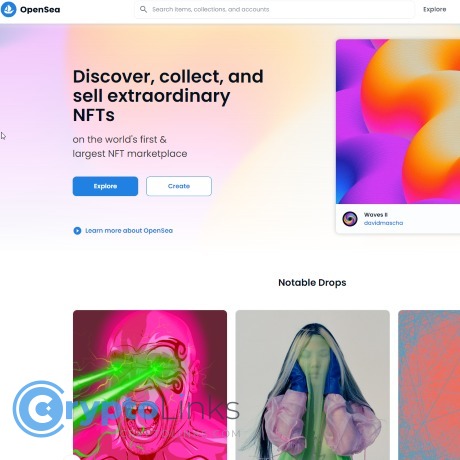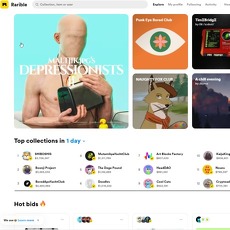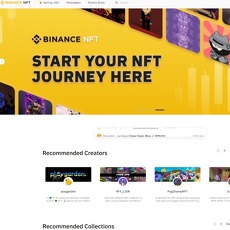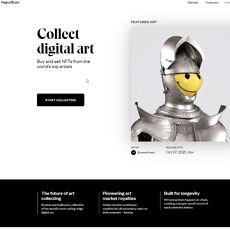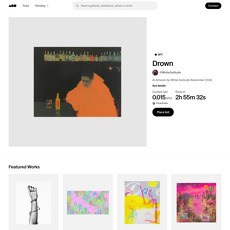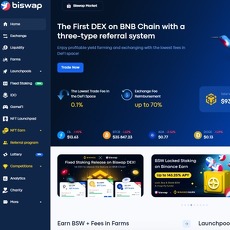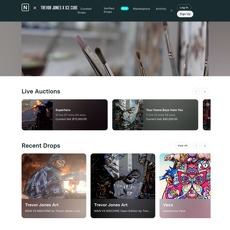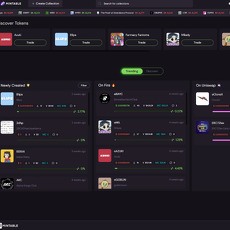OpenSea Review
OpenSea
opensea.io
OpenSea Review Guide: Is It the Best NFT Marketplace for You? Everything You Need to Know + FAQs
Have you ever wondered what's behind the enormous popularity of OpenSea, that NFT marketplace everyone seems to be talking about? NFTs (non-fungible tokens) have skyrocketed in popularity recently, taking over the internet, news headlines, and investors' attention. OpenSea, the largest marketplace for these unique digital assets, seems to be at the center of it all—but is it really worth your time, money, and trust?
I'm here to guide you through an honest, no-fluff review covering just about everything you might want to know about OpenSea. We'll walk through key details like:
- How OpenSea actually works behind the scenes
- How you can easily buy and sell NFTs on the platform
- The important things you need to keep in mind about fees, security, and profitability
- Answers to critical questions users always bring up when thinking about using OpenSea
Common Concerns When Getting into OpenSea
Jumping into something new like NFTs or using OpenSea can feel intimidating, especially for beginners. Chances are, you've probably asked yourself these same questions:
- "Is OpenSea actually safe and legit?"
- "Can I make real money easily by selling NFTs here?"
- "What about all those hidden fees—how much will this really cost me?"
- "I’m a beginner—will I get lost, or is the platform user-friendly?"
If any of these concerns sound like you, you’re definitely not alone. These are the most common and important questions facing newcomers who step foot onto OpenSea.
Don't Worry—I've Got You Covered
As we continue, I'm going to break down these questions into clear, straightforward answers, providing you all the key points and insights you need without confusing jargon.
My goal is simple—help you make an informed decision without sifting through overly technical explanations or complicated terms. I’m going to lay it out honestly, transparently, and straight-up, so you can quickly tell if OpenSea is the right NFT marketplace for you.
So, what's actually driving the buzz around OpenSea, and why is everyone talking about it in the crypto world?
Stick with me—I’m about to explain exactly what OpenSea is, how it came to dominate the NFT marketplace scene, and why it captured the interest of digital artists, crypto enthusiasts, celebrities, and everyday users alike.
What Exactly Is OpenSea, and Why Is It Popular?
You probably heard the name "OpenSea" thrown around whenever NFTs are brought up. But what's really behind its massive success, and why does it keep attracting thousands of creators, buyers, and even celebrities?
How OpenSea Started?
OpenSea was born in 2017 amidst the crypto boom, founded by Devin Finzer and Alex Atallah, two friends passionate about decentralized tech. Originally, it started as a small marketplace focused largely on CryptoKitties—a quirky crypto-collectible game that gained traction around that time.
But Devin and Alex saw more than digital kitties—they envisioned an open marketplace that could host all kinds of digital collectibles, art, virtual land, gaming items, domain names, and just about anything digital you could own uniquely. With this clear vision, OpenSea quickly evolved from humble beginnings to something much more ambitious.
"We want to help build a new economy powered by creators, collectors, and the blockchain." – Devin Finzer, OpenSea CEO.
Why OpenSea Became the Top NFT Marketplace
Today, OpenSea comfortably holds the title of the largest NFT marketplace. But it's not just pure luck or hype that got them here—several factors contributed to its incredible growth:
- User-Friendly Experience: Whether you're new to crypto or have a lifetime of experience, OpenSea provides a smooth, intuitive user interface. Anyone can easily browse, buy, and sell NFTs without feeling overwhelmed by techy complexity.
- Massive Variety of NFTs: From Beeple artworks selling for millions, to NBA Top Shot highlights, CryptoPunks, or even virtual real estate in Decentraland, OpenSea hosts an unmatched diversity of NFTs that appeals to every type of collector or enthusiast.
- Freedom for Creators: Creators can mint and sell NFTs straight from their crypto wallets, no complicated approval process or restrictions. All you need is your creativity and an Ethereum wallet, and you're set up to share your creations with the world—no gatekeepers required.
- Support for Multiple Blockchains: OpenSea isn't solely Ethereum-focused—it has expanded to include affordable alternatives like Polygon, cutting costs for users severely hindered by Ethereum’s notorious gas fees.
- Celebrity Endorsements & Mainstream Attention: Influencers and celebrities like Logan Paul, Snoop Dogg, Gary Vee, and Elon Musk propelled NFTs into public consciousness. Their interaction and minting experiences on OpenSea brought the platform massive credibility and mainstream status.
To put things in perspective, by August 2021 alone, OpenSea processed NFT trades surpassing $3 billion—solidifying its position as the ultimate go-to hub for NFT traders.
So, if a digital marketplace can pull numbers and gain attention comparable to big traditional businesses, you'd naturally wonder: "What exactly can you do yourself on a platform like OpenSea? What possibilities could NFTs offer you personally?"
What Can You Actually Do on OpenSea?
If you've been hearing about OpenSea but are wondering what exactly you can accomplish in the world’s biggest NFT marketplace, you’re in for a pleasant surprise. OpenSea isn’t just a place to look at pixelated monkeys or cryptic digital art—it’s become a vibrant hub where everyday collectors, creators, and crypto fans come together to create, trade, and profit from digital collectibles.
But first, as entrepreneur and NFT enthusiast Gary Vaynerchuk famously observed:
"NFTs are more than just collectibles—they represent the moment when culture and technology blur. This is about community and creativity."
So let’s quickly and clearly break down exactly what you can do on OpenSea and how each activity works, step by step.
Buying NFTs
Jumping into the NFT world by buying your first digital collectible on OpenSea is incredibly straightforward. Even if you've never done this before, trust me—it's as easy as online shopping. Here's how it goes:
- Set Up Your Wallet: Connect a cryptocurrency wallet like MetaMask or Coinbase. These wallets store your tokens securely.
- Browse & Search: Find something you like—maybe trending artwork like CryptoPunks, or high-profile collectibles such as NBA Top Shot. Filter by price, popularity, or category.
- Buy or Bid: You can directly buy NFTs at fixed prices or submit your own bid to hopefully snag a better deal.
- Confirm Transaction: Approve the purchase and confirm it right from your crypto wallet—then boom, you're officially an NFT collector!
Simple, right?
Selling NFTs
Ever thought about monetizing your art, photography, or unique designs? OpenSea could be the marketplace you've been waiting for. Selling NFTs is simpler than most think:
- Create Your Collection: Set up an attractive collection page to showcase and brand your NFTs clearly (just like artists Beeple or Trevor Jones have done to stand out).
- Upload & Describe: Upload your digital files such as art, music, GIFs, or virtual land plots. Write descriptions clearly showing potential buyers what's unique and valuable about your creations.
- Set Sale Options: Choose fixed-price or auction-style listings to determine how potential buyers can purchase your NFT.
- List and Sell: Once someone buys your NFT, you'll receive payments in crypto directly to your wallet instantly—ready to withdraw or reinvest.
Remember—NFT artists like Pak and XCOPY have gained huge followings and even bigger paydays using NFT marketplaces like OpenSea. Could you be next?
Minting Your Own NFTs
Minting is simply the term for creating your own original NFTs—and OpenSea has made it easier than ever, even if you're brand new. Without needing complicated tech expertise or coding:
- Upload Your Digital Creation: This can be artwork, photographs, memes, music, videos, or any unique digital items you want to tokenize.
- Customize the Details: Provide the necessary info—title, description, royalty percentages (ensuring ongoing profit every time it's resold), and select your blockchain like Ethereum or Polygon.
- "Mint" and Publish Your NFT: Your creation is now officially recorded on the blockchain, ensuring uniqueness, authenticity, and scarcity.
Since minting NFTs lets creators maintain ownership over their original work while profiting directly from their art, it's revolutionizing content creation worldwide—expanding possibilities in ways we haven't fully grasped yet.
But here's something crucial you might be wondering now: How much will all of this actually cost you?
Buying, selling, or minting could include unexpected fees you're unaware of. Curious about the costs behind these exciting activities? Stick around—because I'm about to clearly break down OpenSea's fees and charges next.
Fees on OpenSea: How Much Does It Actually Cost?
If there's one common thought crossing everyone's mind before jumping onto OpenSea, it's this: how much do NFTs actually cost, considering fees? Let's take an honest, clear look at what you need to know about the fee structure. Spoiler alert: it's not as scary as it sounds, but clarity matters.
Transaction Fees and Gas Fees
Ever heard someone complain they've paid more in gas fees than the NFT itself? While that's rare, Ethereum gas fees definitely cause heartburn for users sometimes. These fees aren't set by OpenSea; they fluctuate based on network demand, how busy the Ethereum blockchain is at that moment, and even the complexity of the transaction. Think of gas fees as the 'tollbooth fee' you pay for driving your NFT along Ethereum's digital highway.
According to recent stats from the Ethereum Gas Tracker, gas fees can range dramatically—from as low as a few dollars up to several dozen dollars or even more during peak network congestion. In short, timing your NFT purchase when network traffic is lighter (check out Etherscan's Gas Tracker for live updates) can significantly decrease costs.
"It's tough paying gas, but smarter timing saves your crypto cash." – Anonymous NFT collector on Twitter
OpenSea Service Fees
Unlike gas fees, OpenSea service fees are pretty straightforward. OpenSea takes a flat 2.5% commission from each sale. If you sell an NFT for 1 ETH, you'll walk away with 0.975 ETH and OpenSea collects 0.025 ETH. Compared to platforms charging 5% or even 10%, OpenSea's cut is actually pretty reasonable and competitive.
- Easy math: Sell a piece for 0.5 ETH? OpenSea gets 0.0125 ETH.
- No hidden or extra marketplace fees on top of that 2.5%.
- Creators can specify royalties—usually between 5% to 10%—so check carefully if you're reselling someone else's NFT.
In fact, a recent research paper by blockchain analysts at Chainalysis found that users generally feel satisfied paying OpenSea's 2.5% fee, given the exposure their NFTs gain on the platform.
But wait—fees are one thing, but what about security and risks? Is OpenSea even safe enough for your crypto and NFTs? That's something you probably can't afford to ignore. Stick around as we're about to dive into the real story on OpenSea security and scams—and show you exactly what to look out for and how to stay protected.
Is OpenSea Safe to Use? Security and Risks Explained
I get it—when it comes to NFTs and crypto, safety is always the elephant in the room. We've all heard about horror stories of hacks or scams, and you definitely don't want to be the star of one. So, how does OpenSea stack up with its security? Let's take an honest look.
Security Features of OpenSea
First, a quick reality check: no marketplace is completely bulletproof, but OpenSea does a solid job in protecting users. They've integrated multiple layers of security to help keep your NFTs and crypto assets as safe as possible:
- Wallet Integration: OpenSea doesn't store your crypto assets directly on their platform. Instead, they require external crypto wallets like MetaMask or Trust Wallet. This decentralization significantly lowers your risk since you retain control over your digital collectibles.
- Two-Factor Authentication (2FA): Wherever applicable, OpenSea encourages users to activate 2FA, adding a crucial extra shield by requiring verification whenever certain account activities occur.
- Activity Monitoring & Notifications: You'll get timely notifications on key transaction activities, keeping you updated instantly in case anything unusual happens—catching scams early can really save the day.
- Transparent Transaction History: Every activity can be viewed publicly on blockchain explorers like Etherscan, giving you transparent, verifiable proof of every NFT transaction.
"Security isn't expensive—it's priceless." – Jerry Smith, cybersecurity expert
OpenSea definitely invests time in creating a safer experience, but remember that the best defenses also depend on you: how careful you are, how strong your passwords are, and how you handle sensitive information.
Common Risks and Scams to Watch Out For
Unfortunately, even reputable platforms like OpenSea aren't immune to NFT scams. Staying aware can save you headaches (and heartaches). Here are some common threats spotted around NFT marketplaces, alongside tips to dodge them:
- Fake or copied NFTs: Fraudsters might copy original art and list it for sale pretending to be the creator. Always verify the NFT comes from the official, verified artist profile. A quick cross-check can help you avoid this.
- Phishing Attacks: Cybercriminals may send emails or messages masquerading as OpenSea to trick you into sharing your wallet seed phrase. OpenSea never asks for seed phrases or private keys. Always double-check the sender's information and never share sensitive details with anyone—ever.
- Pump & Dump Schemes: Certain NFT collections experience artificial spikes in price caused by coordinated buying—creating FOMO (fear of missing out). If you see sudden unexplained pumps in NFT pricing, sit back and think twice before buying.
- Impersonation Scams: Scammers may pretend to be popular NFT artists or influencers offering exclusive deals. Verify profiles on multiple platforms before engaging or sending funds.
A recent survey revealed more than 30% of NFT newcomers fell victim to scams due to lack of vigilance (according to Chainalysis NFT Report 2022). Staying informed and cautious is your strongest armor.
Feeling concerned about these risks? Don't worry—that's normal! But what you're really wondering now is probably: "Okay, OpenSea sounds secure enough, but what about other issues hiding beneath the surface? Are there downsides I should know before jumping in?" Stick around—I’ll tackle that question next.
Pros and Cons of Using OpenSea
Alright, let's get real—no NFT marketplace is perfect, and OpenSea isn't an exception. Like everything else, there are both ups and downs you'll want to weigh before spending your time (and precious crypto) here. Let me honestly unpack what I love—and what's not so impressive—about OpenSea.
Advantages of OpenSea
- User-Friendly Interface: One of OpenSea's strongest suits is its beginner-friendly user interface. Whether you're just starting your NFT journey or already a pro, you can quickly find your way around. In fact, a recent Blockgeeks study shows how easy navigation significantly contributes to OpenSea's massive success.
- Massive Selection: OpenSea boasts millions of NFTs across countless categories and collections. Whether you're into digital art, gaming assets, metaverse land, or collectibles—OpenSea probably has it. It's like the Amazon of NFTs, where just about anything you can imagine is waiting to be discovered.
- Transparency and Trustworthiness: Transparency is a big deal in crypto, and OpenSea scores high in this regard. With public blockchain records of every transaction, there's no shady business hiding behind closed doors.
- Supports Multiple Blockchains: Apart from Ethereum, OpenSea welcomes NFTs minted on Polygon, Arbitrum, Optimism, and others—giving you more low-fee options when gas prices spike up.
"Having a trustworthy, simple-to-use platform is integral in an industry as rapidly evolving as NFTs." — Crypto influencer, Marko Z, NFT Summit 2022
Disadvantages of Using OpenSea
- High Ethereum Gas Fees: Look, Ethereum gas fees genuinely hurt your wallet sometimes. Transaction costs can balloon dramatically when network use spikes, making it expensive just to list or buy NFTs at busy times.
- Oversaturation from Low-Quality NFTs: Let's face it—not everything on OpenSea is gold. Due to the platform's accessibility, you’ll find tons of low-quality, spammy NFTs cluttering the market, making quality assets harder to find if you don't know exactly what you're looking for.
- Lack of Quick or Personalized Support: Having trouble with a transaction? Good luck getting immediate help from their support team. With such a vast user base, customer service is often slow and impersonal, leaving you hunting through online forums and FAQs to resolve issues yourself.
So there you go—a truthful rundown, without sugarcoating. Now, before making your decision to jump into the OpenSea journey (or seek alternatives), you must have plenty of burning questions, right? Like, can you realistically make money selling NFTs on OpenSea, or how easy is it if you're starting fresh?
I'll answer those intriguing questions clearly next, so keep reading and find out!
Frequently Asked Questions About OpenSea
Now, let's address a few essential questions that users often ask me about OpenSea. I've noticed plenty of excitement, doubt, and curiosity around this topic—I'll break it down for you clearly and openly, like I'd do for a good friend.
How Do I Start Selling on OpenSea?
Starting your journey as an NFT seller on OpenSea doesn't have to be complicated. Here's the simplest way I explain it to friends and family:
- Open Your Crypto Wallet: If you haven't already done it, use something like MetaMask or Coinbase Wallet and connect it directly to OpenSea.
- Create an Account: Simply log into OpenSea with your crypto wallet—no repeated registrations or lengthy email sign-ups involved.
- Upload Your NFT: Click "Create," then upload your digital artwork, photo, video, gif, or audio.
- Provide Details: Add the name, description, and special attributes. This part helps buyers find your NFT.
- List and Sell: Choose fixed prices or auctions, then publish it to the marketplace.
You're in business! It's genuinely that straightforward. But keep reading—I promise you'll find some vital insights below.
Can You Really Make Money on OpenSea?
"Success is not the key to happiness. Happiness is the key to success. If you love what you're doing, you will be successful." - Albert Schweitzer
It's true—people can and do make significant profits on OpenSea. Many NFT artists and traders have achieved notable success. For instance, Beeple famously sold his "Everydays" NFT at Christie's for an astonishing $69 million!
But let's keep things realistic: Most sellers won't become overnight millionaires. It takes time, creativity, understanding market trends, and consistent marketing and engagement. If you enter OpenSea looking to genuinely connect with collectors, showcase your creative passion, and steadily build up your portfolio, your odds of financial success definitely improve.
Is OpenSea Good for Beginners?
Absolutely—and here's why.
- Simple Interface: OpenSea's interface is intuitive and user-friendly, even for complete NFT beginners.
- No Coding Required: You upload and sell artwork easily, without any tech skills.
- Learning Resources: There are loads of tutorials, guides, and community support if you get stuck along the way.
But here's my honest tip: even though it's beginner-friendly, there is a learning curve involved in understanding things like fees and crypto wallets. So take your time, learn as you go, and keep exploring helpful resources like you're doing here today.
Do I Need Crypto to Buy NFTs on OpenSea?
Yes—generally, most NFTs on OpenSea require cryptocurrency such as Ethereum (ETH) for purchases. You'll need a crypto wallet (like MetaMask or Coinbase Wallet) funded with Ethereum or another supported cryptocurrency.
However, some sellers offer alternative payment options through card payments (provided via third-party tools). Just know that crypto remains the preferred currency for NFTs, and familiarizing yourself with crypto payments really opens doors in this space.
Can You Use OpenSea Without Ethereum?
Yes, you certainly can! While Ethereum is the dominant NFT blockchain, OpenSea also supports Polygon (previously known as Matic)—a fast, much cheaper blockchain alternative compared to Ethereum gas fees.
Polygon lets you mint NFTs free of complicated or expensive transaction costs, and many beginners particularly like this cost-effective route to start selling NFTs. However, note that many well-known NFT collections, collectors, and major sales still primarily favor Ethereum, so factor that into your decision.
Curious to know about other resources to level up your NFT skills?
Keep scrolling because I've got some carefully curated additional NFT learning resources coming up next, perfect for boosting your chances of success. Trust me—you won't want to miss it!
Additional Helpful Resources for NFT Enthusiasts
Exploring NFTs on OpenSea can be both exciting and a bit intimidating, but luckily, there's a wide variety of fantastic resources out there to help you stay informed, make smart decisions, and find hot trends before they peak. These resources are perfect if you're looking to boost your knowledge beyond what I've covered here and become sharper at trading, collecting, or creating NFTs.
Useful NFT Research and Information Sources
Here are some top-notch, trustworthy platforms that I personally recommend checking out:
- NonFungible.com: A seriously detailed data resource offering analytical insights into NFT sales trends, market performance, and real-time volume updates. Whether you're curious about the top-selling artists or you want to spot new trends early, this one is a gem.
- Dune Analytics: A fantastic free platform for deeper crypto and NFT analytics. Users can access community-created dashboards or even build their own to track OpenSea trends, market stats, and more—perfect if you're data-driven or curious about NFT trading volumes.
- The NFT Times (Substack newsletter by Matty DCL Blogger): One of my favorite newsletters, offering easy-to-follow updates about the dynamic NFT industry. Matty covers insightful case studies, investment strategies, and emerging trends so you won't miss out on actionable information.
- NFT Now: A digital powerhouse for NFT-related news, artist spotlights, and expert insights. NFT Now is always updated, engaging, and multimedia-rich, giving you the freshest scoop in a readable format.
- OpenSea Blog: Straight from the marketplace itself, OpenSea's official blog regularly shares marketplace updates, new feature announcements, and invaluable educational content. If you already like OpenSea, don't overlook their own resources—plenty of great knowledge there.
All the sources above are trustworthy and carefully handpicked to ensure you're armed with quality NFT insights. Remember, the NFT market moves really fast—people who succeed typically have their finger on the pulse by using trusted, up-to-date resources. I highly recommend bookmarking these websites or, better yet, subscribing to their newsletters for regular updates.
Feeling ready to start your own NFT adventure now? I've got you covered in the next section, where I'll outline exactly how you can easily get started on OpenSea today—plus some key reminders you'll want handy before you leap into action. Curious about how to quickly set up your OpenSea account or avoid common rookie pitfalls? Stick around a bit more because you're just moments away from mastering it!
Ready to Explore OpenSea? Here's How to Get Started Today
If you've come this far, it's clear you're seriously considering OpenSea as your next destination for NFTs. That's great news! OpenSea really does offer a unique gateway for artists, creators, collectors, and pretty much anyone curious enough about the roaring NFT space.
But hold on—before you rush straight in, let's break things down one last time clearly and simply, making sure you're 100% confident about what you're about to do next.
Simple Steps to Create an Account
Good news: getting started with OpenSea is easy and takes only a few minutes:
- Step 1: Get a Wallet. You'll need a crypto wallet like MetaMask or Coinbase Wallet to interact with OpenSea. Keep it secure—you're essentially your own bank with crypto wallets!
- Step 2: Fund Your Wallet (Optional). You might want to buy some Ethereum (ETH) or Polygon (MATIC). This way, if you see a great NFT deal, you're ready to act immediately without delays.
- Step 3: Sign Up for OpenSea. Visit OpenSea.io, connect your wallet, and verify your account. It's that straightforward—no complex KYC or lengthy approvals necessary.
- Step 4: Start Exploring! Once connected, you can immediately browse, buy, sell, or even mint new NFTs to grow your digital collection and potentially make profits.
Key Reminders Before You Start
Before you leap, here’s a super-quick checklist to ensure a smoother and safer journey:
- Secure Your Wallet: Your wallet’s security is your responsibility. Enable two-factor authentication, never share your seed phrase, and avoid suspicious links and messages.
- Be Realistic: Yes, NFTs can be profitable—but don’t count on overnight riches. Real success requires research, patience, and strategic planning.
- Prepare for Fees: Ethereum gas fees fluctuate—look out for cheaper fees during off-peak hours. Also, explore Polygon NFTs for lower-cost alternatives.
- Do Your Research: Not all NFTs are equal. Stick with creators or projects that have transparent teams, good reputations, or proven track records to limit your risks.
Final Thoughts (Conclusion)
OpenSea remains the most robust, lively, and popular NFT marketplace out there. From ease-of-use and vast collections to solid security features, there's plenty to like. But yes, it has its quirks—like fluctuating gas fees and loads of low-quality NFTs. The bottom line? OpenSea can be fantastic with proper care, research, and expectations.
If you're looking for a vibrant marketplace to explore, trade, and possibly profit from NFTs—or if you're simply eager to understand this intriguing new digital economy—I strongly believe OpenSea is still your go-to option.
Ready to take that next step? Set up your account today, dive carefully into this exciting NFT world, and don’t forget to return to Cryptolinks.com frequently for plenty more guides, trustworthy reviews, and honest crypto insights to stay ahead in this crypto-powered future!

